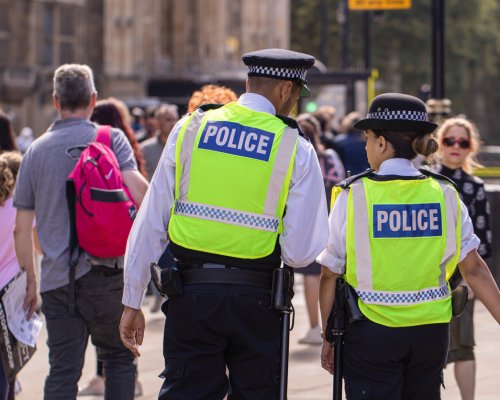Welcome to a new era of policing, where technology serves as a powerful ally in achieving the ambitious goals set forth by police forces across the UK. The challenges facing police forces require innovative solutions that not only respond to immediate needs but also lay the groundwork for safer, more resilient communities.

At the heart of every police force’s mission lies a set of core objectives designed to uphold the fabric of society and ensure the safety and well-being of its community. Let’s delve into the main goals that drive the relentless policing efforts
Safe communities are the bedrock of a thriving society. Building trust and confidence in policing requires a multifaceted approach that addresses the unique needs and concerns of residents. Through proactive engagement and strategic initiatives, police forces aim to create environments where every individual feels secure and supported.
This also extends to safeguarding and supporting vulnerable people. Policing plans prioritise the safeguarding and support of these individuals, ensuring that objectives and tasks are aligned to address their specific needs. From regular location visits to comprehensive briefing protocols, every action is geared towards providing a safety net for those most in need.
Communities are diverse, and their challenges vary greatly. Police forces recognise the importance of tailored solutions that address local issues effectively. By embracing a localised approach, law enforcement agencies can respond promptly to emerging concerns and foster a sense of ownership and collaboration among residents.
A skilled and resilient workforce is the backbone of effective policing. Policing plans prioritise the development and well-being of frontline staff, ensuring they have the training, support, and resources needed to succeed. From leadership development programmes to comprehensive well-being initiatives, law enforcement agencies invest in their personnel, empowering them to deliver exceptional service and make a positive impact in their communities.
Lastly, building a culture of continuous improvement lies at the heart of policing excellence. Policing plans prioritise the cultivation of a culture that values learning, innovation, and organisational development. By embracing audit, assurance, and organisational learning initiatives, fostering a culture of continuous improvement, driving excellence and innovation across all aspects of policing.

Crime prevention lies at the core of policing efforts. By implementing proactive strategies and leveraging data-driven insights, law enforcement agencies aim to reduce crime rates and minimise neighbourhood harm. Through targeted interventions and community partnerships, police forces work tirelessly to create safer environments for all.
Serious and organised crime poses a significant threat to public safety and security. Policing plans prioritise the disruption and dismantling of criminal networks through coordinated operations and intelligence-led strategies. By staying one step ahead of organised crime, law enforcement agencies safeguard communities from harm and uphold the rule of law.
Police forces are also committed to preventing acts of terrorism through vigilant monitoring, robust intelligence gathering, and proactive counterterrorism measures. By working closely with partners at the national and international levels, police forces strive to safeguard societies from extremist ideologies and violent extremism.
This also extends to improving National Fraud and Cybercrime Reporting Services. Policing plans prioritise the enhancement of reporting services to combat these evolving threats effectively. By improving coordination and information sharing, law enforcement agencies empower citizens to report incidents promptly, enabling swift and targeted responses to cybercriminal activities.
Another goal within reducing crime is to have fewer repeat offenders and fewer victims. Breaking the cycle of crime requires a multifaceted approach that addresses the root causes of offending behaviour. Policing plans aim to reduce recidivism rates by providing support and rehabilitation services to offenders while also prioritising victim support and restitution. Through holistic interventions, police forces seek to create safer communities with fewer victims and a lower risk of reoffending.
Efficiency and effectiveness are essential pillars of modern policing. Policing plans focus on optimising resources and streamlining operations to deliver high-quality services to communities. From improved procurement practices to agile working models, police forces embrace innovation to enhance service delivery and meet evolving demands effectively.
One key aspect of efficiency is timely responses are critical in addressing emerging threats and incidents. Policing plans prioritise improved responsiveness through enhanced communication channels, streamlined workflows, and data-driven decision-making. By empowering frontline officers with the tools and information they need, law enforcement agencies ensure swift and effective responses to community needs.
Technology plays a pivotal role in modern policing, empowering police forces to adapt and innovate in a rapidly changing environment. Policing plans prioritise the rollout of updated technology solutions that enhance operational capabilities, improve data management, and facilitate information sharing. By embracing cutting-edge tools and platforms, police forces stay ahead of the curve and deliver efficient, future-ready services to communities.
Effective resource planning is essential for maximising operational effectiveness and ensuring optimal allocation of resources. Policing plans focus on aligning people, capabilities, and skills to meet current and future demands effectively. Through comprehensive workforce planning and strategic resource allocation, law enforcement agencies build resilient, adaptive organisations capable of tackling evolving challenges head-on.
Reach out to our team of experts for more information.
In the relentless pursuit of policing objectives, technology serves as a force multiplier, amplifying the efforts of police officers and driving tangible results. IR3 Operational stands in the lead of this technological revolution, offering cutting-edge solutions that empower police forces to achieve their goals effectively and efficiently. Here is how IR3’s features are designed to address the unique goals:
At the core of IR3 Operational lies a commitment to aligning objectives with the needs of vulnerable individuals. By ensuring that tasks and objectives take into account the specific requirements of these communities, IR3 Operational fosters a sense of support and inclusivity, empowering vulnerable people to feel valued and protected.
IR3 Operational facilitates strategic location visits, providing tangible reassurance to vulnerable populations. By demonstrating that key locations have been visited and patrolling strategies are in place, IR3 Operational highlights the proactive measures taken by the police to safeguard vulnerable communities and deter potential threats.
Utilising geo fences, IR3 Operational enables proactive compliance monitoring, ensuring that objectives and patrolling strategies are effectively implemented. By identifying areas of concern and assessing the efficacy of existing strategies, IR3 Operational empowers law enforcement agencies to adapt and refine their approaches, fostering a culture of continuous improvement and accountability.
IR3 Operational delivers comprehensive briefing capabilities, equipping local officers with up-to-date information on victims, suspects, and potential threats within their communities. By providing insights into vulnerable individuals and potential exploiters, IR3 Operational enables officers to act swiftly and appropriately, fostering a proactive approach to safeguarding vulnerable populations.
With its intuitive mobile app, IR3 Operational keeps local officers informed and empowered to address emerging issues effectively. By providing real-time updates on vulnerable individuals and incidents within their vicinity, the mobile app ensures that officers are equipped with the latest information, enabling them to respond promptly and decisively to community needs.
Through comprehensive incident response capabilities, IR3 Operational offers supervisory oversight and resource deployment insights related to incidents involving vulnerable populations. By facilitating transparency and accountability in incident management, IR3 Operational enables supervisors to ensure compliance with protocols and allocate resources effectively, further enhancing community safety and confidence in policing.


IR3 Operational enables police forces to foster safe communities by facilitating proactive engagement and strategic initiatives. From targeted location visits to comprehensive briefing protocols, IR3 Operational provides the tools and insights needed to address the unique needs of vulnerable populations and build trust and confidence in policing.
At the heart of IR3 Operational lies a robust data analytics engine that empowers police forces to make informed, data-driven decisions. By leveraging real-time data and predictive analytics, law enforcement agencies can identify emerging threats, allocate resources effectively, and proactively address crime and security challenges.
IR3 Operational streamlines workflows and enhances operational efficiency, enabling police forces to deliver high-quality services to communities. From improved resource planning to agile working models, IR3 Operational optimises processes and empowers frontline officers with the tools and information they need to respond swiftly and effectively to community needs.
IR3 Operational fosters a culture of continuous improvement, driving excellence and innovation across all aspects of policing. By providing comprehensive audit, assurance, and organisational learning capabilities, IR3 Operational empowers law enforcement agencies to identify areas for improvement, implement best practices, and drive positive change.
IR3 Operational enhances your ability to evaluate and optimise incident responses. By analysing response patterns, IR3 Operational identifies areas of over-resourcing or under-resourcing. It pinpoints trends linked to factors such as role, location, or incident type, providing actionable insights to better allocate limited resources and improve overall effectiveness.
IR3 Operational ensures that you meet the objectives set by supervisors and managers. It helps identify unmet tasks, revealing whether issues stem from resource shortages, misallocation of resources, skill gaps, or exceptional demand. This analysis supports strategic adjustments to improve performance and meet set goals efficiently.
With IR3 Operational, you can replay incidents, patrolling strategies, and objectives to understand their outcomes. This retrospective analysis assesses resource sufficiency, deployment effectiveness, and the balance between assigned and unassigned duties. It highlights areas for improvement, offering valuable lessons to enhance future operations.
The insights gained from IR3 Operational serve as powerful debriefing tools. Supervisors can work with officers to review performance, celebrate successes, and identify areas for improvement. These debriefings can inform personal development plans tailored to individual officers, based on operational evidence and real-world performance. This targeted approach supports continuous development and the cultivation of an exceptional workforce.

Home » IR3 Operational | Achieve Policing Plan Objectives
Copyright 2024 Lightbulb Analytics Ltd. | All Rights Reserved.
Company number: 01843754
Registered office address: Egale 1 80 St Albans Road, Watford, Hertfordshire, United Kingdom, WD17 1DL